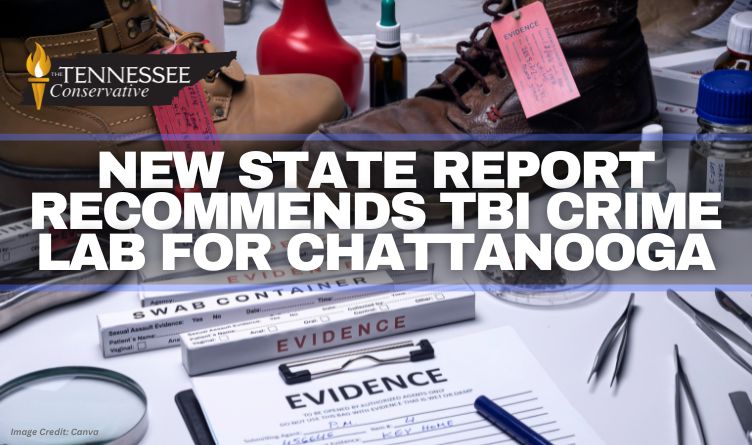Image Credit: Canva
The Tennessee Conservative [By Adelia Kirchner] –
A recent state draft report submitted by the Tennessee Advisory Commission on Intergovernmental Relations (TACIR) recommends the establishment of a small TBI Crime Lab in Chattanooga.
The proposed crime lab would focus on drug-related evidence and toxicology.

This recommendation is part of a larger effort to expediate the examination of criminal case evidence across the state.
Currently, Chattanooga law enforcement submits crime evidence to Nashville for evaluation.
While there are also TBI crime labs in Knoxville and Jackson, the draft report notes that these labs are all running out of physical space for the amount of work that needs to be conducted.
The draft report states that “Adding new capacity in Chattanooga would relieve pressure on the Knoxville lab, improve regional access, and reduce the need to transfer evidence across the state. Although recent state investments have led to improvements in capacity and forensic evidence turnaround times, persistent backlogs continue to delay investigations and court proceedings across Tennessee, and the state’s projected population growth suggests that its current crime lab capacity will not be sufficient to meet future needs.”
Back in 2024, Sen. Sara Kyle (D-Memphis-District 30) and Rep. G.A. Hardaway (D-Memphis-District 93) brought forward legislation directing the TACIR “to study the feasibility of a Shelby County crime lab and the impact of such a crime lab on public health, safety, education, housing, and the economy for citizens and visitors of Shelby County, the city of Memphis, this state, and the Tennessee, Arkansas, and Mississippi tri-state region.”
This was to be done with the assistance of TBI, the District Attorneys General Conference and the Department of Safety.
The legislation further required TACIR to submit a report of the study findings to the Tennessee General Assembly by January 14th, 2025.
While the Democrat-sponsored legislation passed in the Senate on April 18th, 2024, it failed to receive passage in the House.

Despite this fact, in May 2024 Rep. Ryan Williams (R-Cookeville-District 42) requested that TACIR undertake “a broader study to evaluate the feasibility and need for establishing additional crime labs throughout the state, including the existing labs’ capacity to process evidence efficiently and consideration of potential locations for any new crime labs to optimize resources.”
A June 12th memorandum regarding the submission of the new state draft report states that lack of physical lab space is now the primary factor constraining the capacity of TBI’s labs.
“In the last few years, the Tennessee Bureau of Investigation (TBI) has increased its testing capacity by hiring additional scientists, and turnaround times for some testing categories have improved. But other categories have not improved, and on top of that, demand for testing continues to increase,” the memorandum reads. “The Comptroller’s 2024 performance audit identified workspace expansion as the next significant challenge in TBI’s Forensic Services Division because adding more staff means needing more space to accommodate them.”

The memorandum continues:
“In March 2024, TBI completed a real estate strategic plan that outlines future expansion goals, including expansion of the Jackson lab, renovation and expansion of the Nashville lab, plans for a new, larger lab in Knoxville to replace the current one, and the establishment of a smaller lab in Chattanooga.
According to TBI, the additional capacity will aid it in reducing turnaround times to its goal of 8 to 12 weeks for all testing. Although funding for the future projects in Nashville, Knoxville, and Chattanooga has not yet been secured, the expansion of the Jackson lab is planned to begin in 2025.
Ultimately, without confronting the constraint of limited lab space, the state’s efforts to further improve forensic evidence processing and public safety will be hindered. The commission recommends that the state increase crime lab capacity in each grand division, in line with TBI’s 2024 real estate strategic plan, specifically by expanding the existing Jackson and Nashville labs, replacing the existing Knoxville lab with a larger lab with capacity for firearms testing, and adding a smaller, focused lab in Chattanooga for drug-related evidence and toxicology. Additionally, the commission recommends that TBI and the city of Memphis enter into an agreement for a firearm analyst in the Jackson lab dedicated to Memphis cases and that expansions at the Nashville lab focus on the most overburdened disciplines—like forensic chemistry and toxicology.”
As the state works on a long-term expansion of its TBI facilities, TACIR is recommending the following practices to help reduce backlogs, improve public safety, and expedite forensics:
- TBI should continue to look for areas to improve efficiency using external process improvement methods, as recommended by the National Institute of Justice.
- The General Assembly should amend DNA testing laws to allow rapid DNA implementation at law enforcement booking stations.
- The state should support resource-sharing partnerships for training local law enforcement agencies across the state through funding and technical assistance.
The 82-page draft report states that demands for testing continue to increase across the state and provides the following points on testing turnaround and demand:
- Turnaround times for sexual assault cases have decreased from 45 weeks in August 2022 to 14 weeks in December 2024.
- Turnaround times for violent forensic biology evidence increased from 24 weeks in January 2022 to 37 weeks in January 2025.
- Turnaround times for firearms analysis increased from 38 weeks to 67 weeks in the same period.
- Demand for all forensic biology tests increased 7% statewide over the past three years.
- The total number of requests for all testing categories at TBI’s Jackson and Knoxville crime labs increased by 17% and 4%, respectively, between 2023 and 2024.
“Tennessee’s comparatively high rates of crime and population growth mean that demand for testing is likely to continue to increase,” the report reads. “Tennessee’s violent crime rate in 2023 was well above the national rate, but even if crime rates were to decrease in the future, projections for the state’s population growth suggest the volume of cases and evidence that needs to be tested could continue to grow.”


About the Author: Adelia Kirchner is a Tennessee resident and reporter for the Tennessee Conservative. Currently the host of Subtle Rampage Podcast, she has also worked for the South Dakota State Legislature and interned for Senator Bill Hagerty’s Office in Nashville, Tennessee. You can reach Adelia at adelia@tennesseeconservativenews.com.


